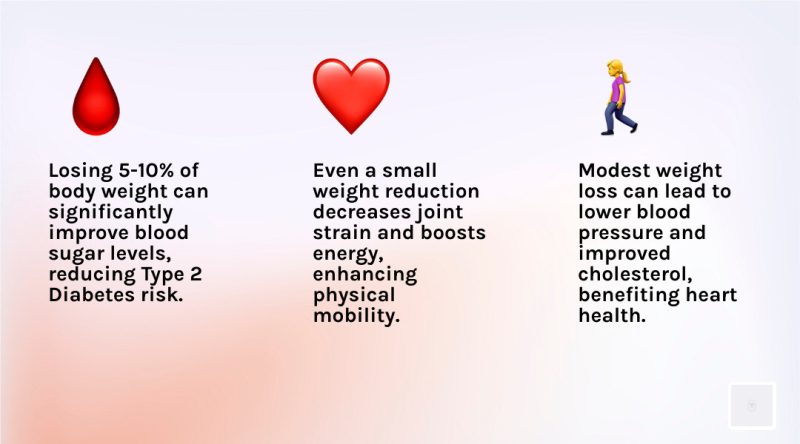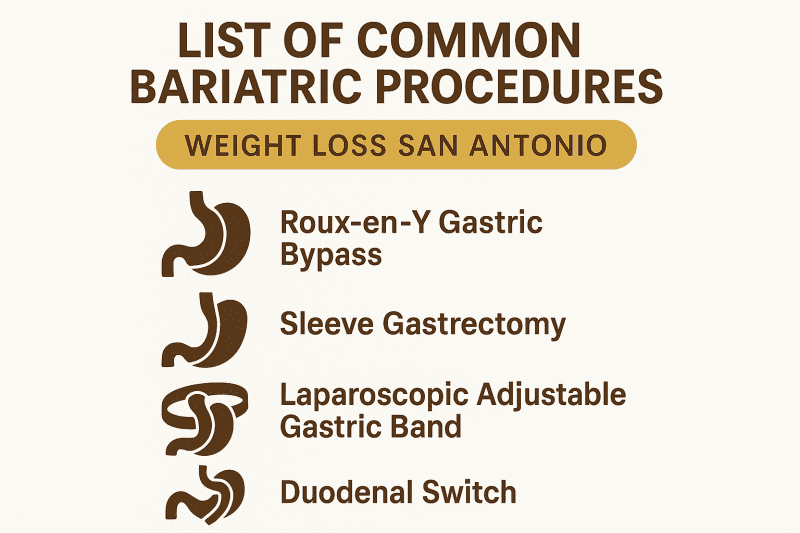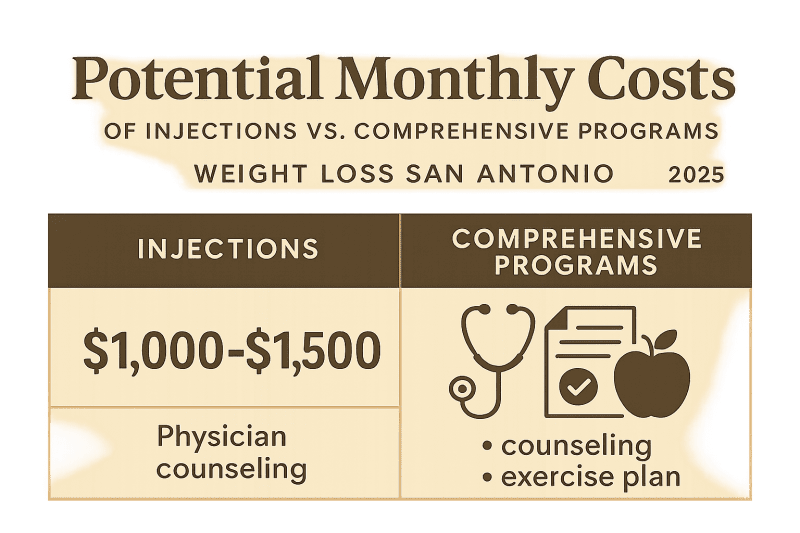Shedding Pounds in SA: The Ultimate Guide to San Antonio’s Top Weight Loss Programs

Reaching a healthy weight can open doors to a more energetic and fulfilling life for San Antonio residents. We understand that navigating the many options available can feel overwhelming.
That’s why we’ve created this extensive guide. We aim to simplify your search for effective weight loss solutions in San Antonio. We will explore various programs, from medically supervised options to specialized diet and exercise plans.
We’ll also dig into important aspects like medical treatments, the latest advancements, and how to choose a program that fits your needs. We aim to provide clear, reliable information to help you make informed decisions.

San Antonio offers diverse weight loss programs catering to various needs, preferences, and health conditions. From highly structured medical interventions to more holistic wellness approaches, finding a program that aligns with your individual goals and provides sustainable results is key.
The types of programs available generally fall into several categories: medical weight management, bariatric surgery options, specialized diet protocols, and comprehensive wellness programs that integrate multiple aspects of health. Many leading centers in San Antonio, such as the Methodist Hospital Metropolitan Weight Loss Center, are recognized as a Bariatric Center of Excellence with OPTUM-UHC and Aetna, and Blue Distinction Center Facilities with BlueCross BlueShield. This accreditation signifies a high standard of care and comprehensive services.
Medically Supervised vs. DIY Approaches
The distinction between medically supervised weight loss and do-it-yourself (DIY) approaches is crucial. While many individuals attempt weight loss through diet and exercise alone, medically supervised programs offer a significant advantage: safety and efficacy.
Medically supervised programs involve oversight from qualified healthcare professionals, including physicians, dietitians, and exercise specialists. This ensures that your weight loss journey is customized to your unique health profile, addressing any underlying health issues hindering progress. For instance, San Antonio weight loss clinics are equipped to address factors like hormonal imbalances, metabolic disorders, and other chronic conditions that contribute to obesity. This comprehensive approach minimizes risks and maximizes the chances of long-term success.
While seemingly convenient, DIY diets often lack the personalized guidance and medical monitoring necessary for safe and effective weight loss. They can lead to nutritional deficiencies, unhealthy eating patterns, and a higher likelihood of weight regain. The benefit of medically supervised weight loss programs lies in their ability to provide a structured, evidence-based pathway, ensuring that weight loss is achieved healthily and sustainably.
Surgical and Non-Surgical Pathways
San Antonio’s weight loss landscape includes surgical and non-surgical pathways, offering options for individuals with varying degrees of obesity and health needs.
Surgical Weight Loss (Bariatric Surgery): For individuals with severe obesity (typically a BMI of 40 or higher, or 35 with co-morbidities), bariatric surgery can be a convenient option. The Methodist Hospital Metropolitan Weight Loss Center, accredited by The Metabolic and Bariatric Surgery Accreditation and Quality Improvement Program, offers a range of procedures:
- Roux-en-Y Gastric Bypass: This procedure involves creating a small stomach pouch and bypassing a section of the small intestine, leading to reduced food intake and absorption.
- Sleeve Gastrectomy: A significant portion of the stomach is removed, leaving a smaller, sleeve-shaped stomach. This reduces the amount of food consumed and impacts hunger-regulating hormones.
- Laparoscopic Adjustable Gastric Band: An inflatable band is placed around the upper part of the stomach, creating a small pouch. This band can be adjusted to control food intake.
- Duodenal Switch: A more complex procedure combining sleeve gastrectomy and intestinal bypass elements, leading to significant weight loss and metabolic improvements.
- Revision Surgery: This is for patients with previous bariatric surgery who have experienced complications or insufficient weight loss.

These surgical options are typically considered after other weight loss methods have been exhausted and are always accompanied by extensive pre- and post-operative support, including nutritional counseling and psychological evaluations.
Non-Surgical Medical Management: For many, surgical intervention is unnecessary or not desired. Non-surgical medical weight loss programs focus on comprehensive lifestyle changes supported by medical oversight. These programs often include:
- Personalized Diet Plans: Customized to individual metabolic needs, dietary preferences, and health conditions.
- Structured Exercise Programs: Designed to improve physical fitness and increase calorie expenditure.
- Behavioral Counseling: To address emotional eating and lifestyle habits and develop coping mechanisms for challenges.
- Weight Loss Medications: Prescribed and monitored by a physician to aid in appetite suppression, metabolism, or fat absorption.
Palo Alto Medical, for instance, has been treating weight management patients in San Antonio since 2003. It emphasizes medically supervised programs with appropriate nutrition and exercise counseling. These programs aim for sustainable weight loss by addressing the root causes of obesity through a holistic approach.
The Rise of Medical Weight Loss: A Physician-Guided Journey
Medical weight loss is a cornerstone of effective and sustainable weight management in San Antonio. This approach goes beyond simple calorie counting, delving into the physiological and psychological factors contributing to weight gain. Clinics in San Antonio prioritize physician oversight, recognizing that obesity is a complex medical condition influenced by various factors, including hormonal imbalances, metabolic issues, and conditions like diabetes and hypertension.

A key aspect of medical weight loss is the comprehensive evaluation process. This typically involves complete health assessments, detailed physicals, and extensive laboratory testing. These tests help identify underlying health factors hindering weight loss, such as thyroid disorders, insulin resistance, or nutrient deficiencies. Metabolic testing, for example, is often used to design a weight loss program exclusively for individuals, depending on their unique test results. By understanding these underlying factors, medical weight loss specialists can create truly personalized plans that target each patient’s specific needs.
The Latest in Weight Loss Injections
One of the most significant advancements in medical weight loss has been the introduction of injectable medications, particularly GLP-1 (Glucagon-like Peptide-1) receptor agonists. These medications have revolutionized weight management, offering a powerful tool combined with lifestyle modifications.
- Semaglutide (Wegovy): Originally approved for Type 2 diabetes (Ozempic), Wegovy is an FDA-approved formulation of semaglutide specifically for chronic weight management. It mimics the GLP-1 hormone, which helps regulate appetite and food intake. Users have reported significant results, with studies showing individuals losing around 15% of their body weight over 68 weeks. It aids appetite suppression, slows gastric emptying, and improves blood sugar control.
- Tirzepatide (Mounjaro): Mounjaro is a dual GIP (Glucose-dependent Insulinotropic Polypeptide) and GLP-1 receptor agonist. This dual action can improve weight loss and blood sugar control. While primarily approved for Type 2 diabetes, it has shown impressive weight loss in clinical trials, with users seeing weight loss of up to 25 pounds.
These injections are administered once weekly via a subcutaneous injection. While highly effective, they are not a standalone solution. They are most successful when integrated into a comprehensive program that includes dietary changes, exercise, and ongoing medical supervision. Weight loss injections can range from $1,000 to $1,500 per month, but insurance coverage can significantly reduce this to a copay as low as $25 per month for eligible patients.
The Team Behind Your Success
The success of medical weight loss programs in San Antonio largely hinges on a multidisciplinary team’s expertise and collaborative effort. These professionals work together to provide holistic support, addressing every aspect of a patient’s health and well-being.
Typically, a medical weight loss team includes:
- Board-Certified Surgeons and Bariatric Physicians: These specialists perform procedures and manage the medical aspects of weight loss for surgical options. For example, the Methodist Hospital Metropolitan Weight Loss Center boasts such expertise.
- Licensed Medical Providers: Physicians, physician assistants, and nurse practitioners who oversee medical evaluations, prescribe medications, and monitor patient progress.
- Certified Coaches and Dietitians: Experts in nutrition and behavioral modification who provide personalized meal plans, educate patients on healthy eating habits, and offer ongoing support and motivation. Jennifer Owen, owner of Ideal Weight Loss of San Antonio, and Lyn Augello, a coach there, highlight the importance of personalized coaching and the Ideal Protein protocol in their success stories.
- Exercise Physiologists: These designers design customized fitness plans based on individual capabilities and goals.
- Mental Health Professionals: These professionals address the psychological aspects of weight loss, such as emotional eating, body image issues, and stress management.
This collaborative approach ensures that patients receive comprehensive care, from initial assessment and treatment planning to long-term maintenance and support.
Core Components: The Role of Diet and Exercise
Diet and exercise are the foundational pillars of any successful weight loss journey, whether undertaken independently or as part of a medically supervised program. In San Antonio, weight loss programs emphasize personalized approaches to these core components, recognizing that a one-size-fits-all method rarely yields sustainable results.

For women, specific weight loss programs in San Antonio often consider hormonal changes and unique physiological needs. Women’s Wellness of SA, for instance, offers medical weight loss customized to address hormonal changes, lifestyle factors, and emotional well-being, providing a holistic approach to weight management for women. This ensures that dietary and exercise plans are effective, safe, and supportive of overall female health.
Crafting Your Ideal Diet Plan
Nutritional guidance is paramount in weight loss. San Antonio clinics offer comprehensive nutritional counseling, moving beyond restrictive fad diets to focus on sustainable, healthy eating habits.
- Personalized Nutrition: Programs like Medi-Weightloss® emphasize physician-prescribed plans based on individual goals, health, and medical history. Their patients lose an average of 29 pounds in 13 weeks, showcasing the effectiveness of custom approaches.
- Macronutrient Balance: Many programs, including Weight No More SA, highlight the importance of a “PCF balance” (proteins, carbohydrates, and fats), asserting that eliminating one of these food groups can disrupt the body’s balance and hinder long-term success.
- Ketogenic Principles: Some programs, such as Ideal Protein, use nutritional ketosis, where the body uses fat for energy by reducing carbohydrate intake while ensuring adequate protein to maintain lean muscle mass. Jennifer Owen lost 33 pounds in 9 weeks using the Ideal Protein protocol, and Lyn Augello lost 55 pounds, demonstrating the efficacy of this approach when properly supervised.
- Meal Planning and Education: Effective programs go beyond telling you what to eat. They teach you how to make informed food choices, prepare healthy meals, and understand how different foods affect your body. This education is crucial for long-term maintenance.
Hydration is also critical to dietary success. Many programs emphasize increased water intake to support metabolism and overall health.
Integrating Fitness into Your San Antonio Lifestyle
Exercise is the other half of the weight loss equation. San Antonio offers numerous opportunities to integrate physical activity into your daily life, and effective weight loss programs capitalize on this.
- Customized Fitness Plans: Unlike generic workout routines, medical weight loss programs provide exercise physiology expertise to create plans custom to your current fitness level, health conditions, and personal preferences. This ensures safety and maximizes calorie expenditure and muscle development.
- Strength Training and Cardiovascular Health: A balanced exercise regimen typically includes strength training to build muscle (which boosts metabolism) and cardiovascular activities to improve heart health and burn calories.
- Sustainable Habits: The goal is not just short-term exercise but fostering sustainable habits. San Antonio’s beautiful parks and trails, such as those along the River Walk or expansive city parks, provide excellent outdoor venues for walking, jogging, or cycling, encouraging an active lifestyle beyond the clinic.
By combining personalized nutrition with custom exercise plans, San Antonio weight loss programs equip individuals with the tools and knowledge to achieve their weight loss goals and maintain a healthier, more active lifestyle.

How to Choose the Right Program for Weight Loss in San Antonio
Selecting the right weight loss program in San Antonio is a pivotal decision that can significantly impact your success. It requires careful consideration of your needs, the program’s methodology, and practical aspects like cost and insurance. A comprehensive San Antonio weight loss guide can provide further insights to help steer these choices effectively.
When evaluating clinics and programs, we recommend scheduling an initial consultation. This lets you discuss your weight loss goals, health history, and concerns. During this consultation, inquire about the program’s approach, the qualifications of its staff, and what kind of ongoing support it provides. Pay attention to patient testimonials and before-and-after examples, but individual results may vary.
Decoding Costs and Insurance for Weight Loss in San Antonio
The cost of weight loss programs in San Antonio can vary widely depending on the type of program, its duration, and the services included. Transparency about pricing is crucial.
- Weight Loss Injections: As mentioned, injections like Wegovy and Mounjaro can range from $1,000 to $1,500 per month without insurance.
- Comprehensive Programs: These might include physician visits, nutritional counseling, exercise plans, and sometimes supplements or meal replacements. Fees can be structured as monthly payments, package deals, or per-visit charges.
- Bariatric Surgery: The cost of the surgery is substantial, but it’s often covered by insurance if medical necessity is established. However, there may be deductibles, co-pays, and pre- and post-operative care costs.
Insurance Coverage: It’s essential to verify your insurance coverage. Many medically supervised programs and bariatric surgeries are covered, mainly if obesity is classified as a medical condition. However, coverage for weight loss medications like GLP-1 agonists can vary significantly by plan. Some clinics, like Medi-Weightloss San Antonio, indicate they accept insurance, while others might offer financial plans or require upfront payment. Always confirm with both the clinic and your insurance provider.

Evaluating Success Rates for Weight Loss in San Antonio
Understanding success rates is essential, but interpreting them realistically is equally important. Success in weight loss is not just about the number on the scale but also about long-term maintenance and improved health markers.
- Average Weight Loss Statistics:Medi-Weightloss®: Patients lose an average of 29 pounds in 13 weeks.
- Weight Loss Injections (Wegovy/Semaglutide): Users have reported losing around 15% of their body weight over 68 weeks. Some Mounjaro users have seen weight loss of up to 25 pounds.
- Ideal Protein: Jennifer Owen lost 33 pounds in 9 weeks, and Lyn Augello lost 55 pounds, demonstrating significant results with their protocol.
- BMI Goals: Programs often set goal weights based on BMI, sex, and age, aiming for a healthy and sustainable target.
- Long-Term Maintenance: The accurate measure of success lies in maintaining the weight loss. Most dieters regain lost weight within five years of dieting if they don’t adopt sustainable lifestyle changes. Programs focusing on education, behavioral modification, and ongoing support are more likely to foster long-term success.
- Individual Results: It’s crucial to remember that individual results may vary based on adherence to the program, underlying health conditions, and personal metabolism. Testimonials inspire but should not be taken as guarantees.
When evaluating success rates, look for programs that emphasize a holistic approach, addressing not just diet and exercise but also behavioral changes and long-term support.
Frequently Asked Questions about Weight Loss in San Antonio
Navigating weight loss can bring up many questions. Here, we address some of the most common inquiries regarding weight loss solutions in San Antonio.
Are weight loss injections like Wegovy and Mounjaro safe?
Weight loss injections like Wegovy (semaglutide) and Mounjaro (tirzepatide) are FDA-approved medications. They are generally considered safe when used under medical supervision and have undergone rigorous clinical trials to prove their efficacy and safety.
However, like all medications, they can have side effects. Common side effects often include gastrointestinal issues such as nausea, vomiting, diarrhea, or constipation, especially when starting the medication or increasing the dose. More serious, though rare, side effects can include pancreatitis, gallbladder problems, or thyroid tumors.
It is crucial to have a professional consultation with a qualified medical provider in San Antonio before starting these injections. They will assess your medical history and current health status and determine if these medications are appropriate for you, ensuring you are monitored throughout your treatment.
How much do weight loss programs in San Antonio typically cost?
The cost of weight loss programs in San Antonio is highly variable, reflecting the diversity of services and approaches available.
- Weight Loss Injections: As noted, monthly costs for medications like Wegovy or Mounjaro can range from $1,000 to $1,500 without insurance. With insurance coverage, this can drop significantly, sometimes to a copay as low as $25 per month, depending on your plan.
- Medical Weight Management Programs: These comprehensive programs, which often include physician visits, dietary counseling, and personalized plans, can range from a few hundred to several thousand dollars for a complete program. For example, Medi-Weightloss® offers physician-supervised programs, and their costs would reflect the medical oversight and structured approach.
- Specialized Diet Protocols (e.g., Ideal Protein): These programs often involve purchasing specific food products or supplements in addition to coaching fees. The total cost can vary based on individual needs and adherence.
- Bariatric Surgery: While the surgery is expensive, it is often covered by insurance if deemed medically necessary, though out-of-pocket costs like deductibles and co-pays will apply.
It’s always recommended to inquire about all potential costs upfront, including consultations, medications, supplements, and follow-up visits, and to thoroughly check your insurance benefits.
What makes a weight loss program successful in the long term?
Long-term success in weight loss programs in San Antonio and elsewhere hinges on several key factors that go beyond quickly losing pounds.
- Medical Supervision: Ongoing medical oversight ensures safety, addresses underlying health issues, and allows for adjustments to the plan as needed.
- Personalized Plans: A program custom to an individual’s unique metabolism, health conditions, lifestyle, and preferences is far more likely to be sustainable than a generic approach.
- Addressing Underlying Health Factors: Effective programs investigate the root causes of weight gain, such as hormonal imbalances, metabolic disorders, or chronic conditions, and provide targeted solutions.
- Behavioral Modification: Learning to identify and change unhealthy eating habits, manage stress, and cope with emotional triggers is crucial for preventing weight regain.
- Education: Understanding nutrition, the impact of food on the body, and how to make informed choices empowers individuals to maintain their weight loss independently.
- Ongoing Support: Continuous encouragement and accountability are vital for navigating challenges and staying motivated, whether through regular check-ins with coaches, support groups, or educational opportunities.
Programs that integrate these elements, fostering a “whole-body change” and a transition to a healthier lifestyle, are best positioned to help individuals achieve and maintain their weight loss goals for the long term.
Conclusion
Starting a weight loss journey in San Antonio means stepping into a vibrant landscape of diverse and practical solutions. The city provides ample resources to support your health goals, from the advanced medical interventions offered by accredited centers to the personalized guidance of diet and exercise specialists.
We’ve explored the spectrum of options, from medically supervised programs and bariatric surgery to the latest advancements in weight loss injections. We’ve also highlighted the critical role of personalized diet and exercise plans, and the importance of a multidisciplinary team in ensuring your success.
The most effective weight loss program is one that is custom-made to your individual needs, medically sound, and committed to fostering sustainable lifestyle changes. We encourage you to take the first step towards a healthier, happier you by consulting with a qualified professional in Texas. They can help you make the right diet choices, address your unique health factors, and guide you toward a path of lasting well-being.

